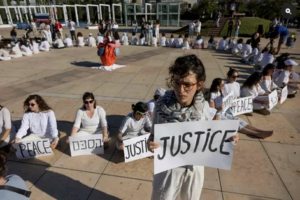What eleven months of war means for Israel’s ‘invisible women’

Israeli and Palestinian women call to end the war and reach a peace agreement, Tel Aviv, December 2023
Ela Alon writes in Haaretz on 25 August 2024:
After nearly eleven months of war, Israel is in a continuous state of trauma. The effects are felt most radically by the country’s already marginalized communities, in particular Israel’s ‘invisible women.’
The atrocities of October 7 and the subsequent war have made a profound impact on women. This is not surprising, as it is well-known that humanitarian crises, from conflicts to natural disasters, always affect women, girls and children the most.
In Israel we have seen a rise in complaints of domestic violence. The women to whom we offer legal advice describe how war trauma, economic stress and the extended periods that men are at home influence the levels of domestic violence. At the same time, women facing abuse are more isolated, because the welfare services don’t prioritize vulnerable women for social worker visits over more directly-war-related cases.
And the ‘invisible women’ – already marginalized and discriminated against due to social, geographical, national, ethnic, and economic factors – are the least protected and thus most affected within Israeli society.
As a women’s rights organization we receive many calls about how the war has destroyed women’s lives. They have lost their jobs and economic security – some because of the economic repercussions of the war, some because they had to assume child care duties when their spouses were called to serve in the reserves. Palestinian citizens of Israel have lost their income due to racism or the fear of racism. Some have received no compensation from the government for their loss of salaries, especially low-income women paid by the hour.
Hundreds of thousands of women have been evacuated from their houses, lost their businesses or are risking their lives to keep working by returning to areas that have been evacuated or are under constant attack despite not being official subjects of evacuation orders. Others could not afford to evacuate at all.
In our work with the Bedouin society in the Negev in southern Israel, we witness the emotional distress of women and children who have no bomb shelters to protect them from Hamas rocket fire and Houthi or Iranian drones, and thus suffer a disproportionate number of casualties. This is on top of the intense poverty caused by losing their places of employment due to the war.
Instead of investing resources in protecting Bedouin citizens, the Israeli government focuses on demolishing their homes due to land disputes. Lately, there has been a major spike in home demolitions in Bedouin settlements in the Negev leaving women, children and men, some of them with disabilities, with no alternative housing, more emotional distress, trauma and a deepening disaffection with the state.
Another effect of the war on Bedouin women in the Negev is on undocumented women – Palestinian women married to Israeli citizens who have lived for years in Israel without official status because of a discriminatory law first passed in 2003, which effectively banned married couples, if they included an Israeli married to a Palestinian, from living together inside Israel. They are hunted, arrested and deported, even though they have young children who are Israeli citizens. Sometimes they are even detained and deported from the hospitals they have turned to for emergency medical care.
Wartime has made many Israeli women’s lives unbearable, but their suffering pales beside the situation of women and children in Gaza and the West Bank, and the Israeli hostages, including 13 women, held by Hamas.
Israeli and Palestinian women desperately need this war to end. We need to bring everyone back home. We need to start the recovery, and to build back better. We need Israel’s government and the international community to take women’s voices and needs into account, and do everything in its power to de-escalate the violence, to push for a cease-fire, to help build a path towards peace.
Ela Alon is the Executive Director of Itach Ma’aki – Women Lawyers for Social Justice.
This article is reproduced in its entirety
